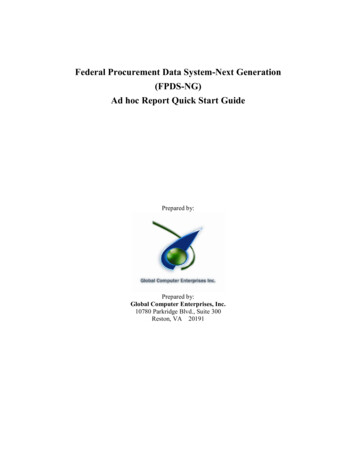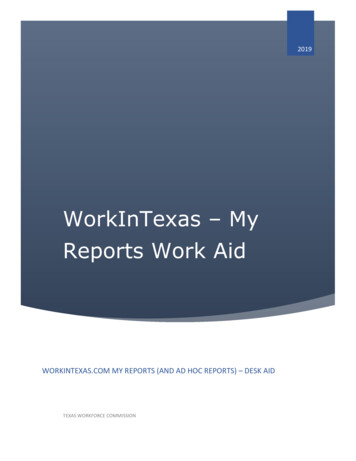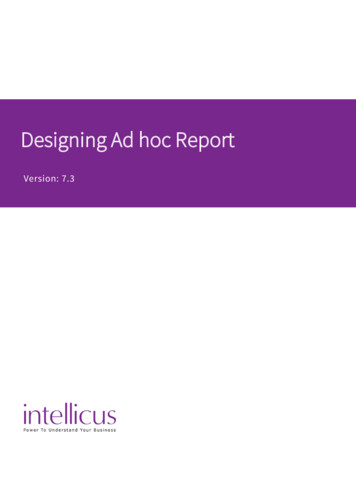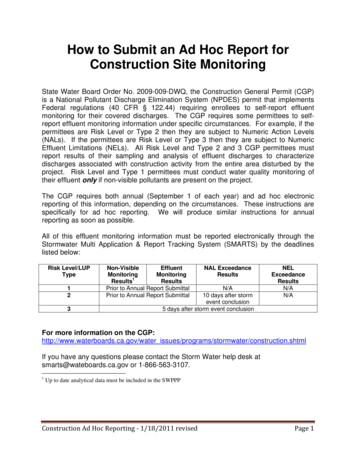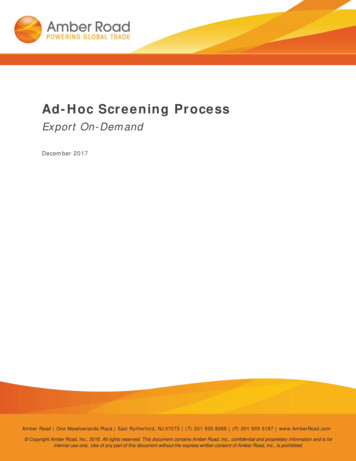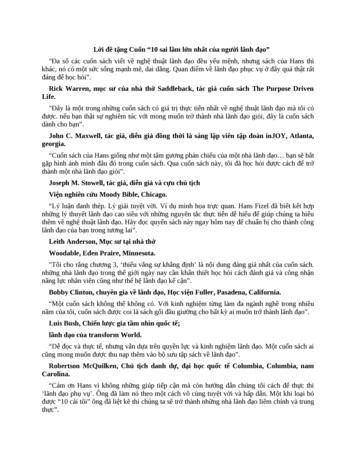
Transcription
For 9 May 2018 Senate MeetingReport of the Ad Hoc Committee on the Governance of Programs andInterdisciplinary Structures of the Hunter College SenateINTRODUCTION. The members of this committee are dedicated to the pursuit ofexcellence at Hunter College. We recognize that the highest educational goals for ourstudents are often achieved when faculty are not bound by traditional disciplinaryboundaries when developing curricula. We also maintain the necessity of establishing clearguidelines about how such courses of study are administered within Hunter College giventhat the CUNY by-laws and the Hunter College Charter are silent on the matter of programdevelopment and oversight. It is in this spirit of collaboration and cooperation that thiscommittee was formed.In accordance with a Senate Resolution adopted on December 7, 2016, an Ad HocCommittee on the Governance of Programs and Interdisciplinary Structures was created.The committee was charged with addressing issues related to the governance of allprograms “including those entities officially named Programs, Institutes, Centers, Schools,and any other non-departmental or interdepartmental entities offering or managingcourses of study in any capacity.” We were further charged “with also (A) researchingcurrent structures and practices pertaining to the governance of such entities at HunterCollege, (B), consulting with all relevant programs and administrative offices, (C)consulting and coordinating with all relevant Senate committees, including theUndergraduate Course of Study Committee, and (D) reporting to the Senate and makingrecommendations for Senate action to ensure the faculty governance of Programs andInterdisciplinary Structures.” In the simplest terms, our concern was addressing allcurricula and courses of study that are currently situated outside of or separate fromacademic departments, as well as those within departments.To accomplish this work, the Senate convened this committee. Nominations were taken tofill the committee according to the membership criteria and the Senate voted to confirmthe committee members. It was comprised of the following members:SAS Social Sciences: Jessie Daniels, (Chair)SAS Arts & Humanities: Janet NearySAS Math & Sciences: Shirley RapsSchool of Social Work: James MandibergSchool of Education: Christina TaharallyNursing, Health Professions, and UPH: Nancy EngInterdisciplinary Programs: Rupal OzaA&S at large (3): Bernadette McCauley; Catherine Raissiguier; Omar DahbourDean (non-A&S): Michael MiddletonUndergrad Students: Edward Friedman and Jacqueline RozadoMA student: Meghann WilliamsProvost (or designee): Lon KaufmanDean of A&S (or designee): Andrew Polsky1
For 9 May 2018 Senate MeetingMembers who serve with voice but no vote:Joseph Lao (Psychology, as Chair of the Senate Governance Committee, 2016-17)Sarah Chinn (English, as Chair of the Senate Governance Committee, 2017-18)Eckhard Kuhn-Osius (German, as Chair of the Senate Undergraduate Course of StudyCommittee)At the first meeting of the committee, the Chair of the Senate reiterated the charge. Thecommittee then discussed its approach to this charge and consequently designated threesub-committees. These were as follows:a.Sub-Committee on Principles, Values, and Vision (Omar Dahbour, Chair). This subcommittee considered how the promotion of flexibility and innovation in scholarship andcurriculum development fits with the values and vision of the college. What are theprinciples and values associated with interdisciplinary innovation? (Perhaps these includeintellectual flexibility, cooperation in research and teaching, and the traversing ofconventional disciplinary divides, for example.) This committee also considered how othervalues at the core of our academic and intellectual mission (such as shared governance,faculty control over curriculum and scholarship, and academic freedom, for example)should inform our approach to innovation and interdisciplinarity. The latter set ofprinciples/values should not be eclipsed by the drive for intellectual flexibility andinnovation, nor should they eclipse the need to develop interdisciplinary andtransdisciplinary structures. Given this set of concerns, what are the core principles andunderlying values that should inform the (whole) committee's approach to its mission?This sub-committee drafted and approved statements of principle and these are included inAppendix C.b. Sub-committee on Personnel and Consultation (Bernadette McCauley, Chair). This subcommittee explored the (1) mapping the terrain of programs, centers, institutes and otherinterdisciplinary structures at Hunter that are relevant to the (whole) committee's work(which might also include determining which are relevant to the committee's mission andgoals and which are not); (2) developing a list of personnel who might have information orperspective to contribute to the committee's mission and work; (3) developing a protocolfor reaching out to such personnel (perhaps interviewing them) in order to inform thecommittee's work.c.Sub-committee on Rules and Procedures (Shirley Raps, Chair). This committee wasconcerned with researching College and University rules and procedures that pertain to thecommittee's work in order to ensure that the committee adheres to them when movingforward with recommendations to the Senate. These rules protect the integrity of ouracademic institution and should not be taken lightly. Important documents include (but are2
For 9 May 2018 Senate Meetingnot necessarily limited to): The Charter for the Governance of Hunter College, officialSenate Procedural documents (such as Procedures for Preparing and SubmittingCurriculum Proposals for College Approval), the bylaws of schools and other academicunits of the college, The Bylaws of the CUNY Board of Trustees, the CUNY Manual of GeneralPolicy, and the PSC/CUNY contract.After the initial meeting, the committee met again on the following dates: 2017: April 4, May 4, May 26, July 19, September 7, October 25 (subcommitteechairs chair only), November 15 and December 5. 2018: March 8, March 21, April 11SURVEY. A good deal of the work of the committee as a whole was spent developing asurvey instrument (Appendix A). It was distributed (with help of Senate OfficeAdministrative Associate, Lara Miranda) to all programs and interdisciplinary structures,including “those entities officially named Programs, Institutes, Centers, Schools, or anyother non-departmental or interdepartmental entities offering or managing course of studyin any capacity.” The goal of this survey, in keeping with the charge of the committee, wasto determine the scope of programs and interdisciplinary structures, and to ascertain theircurrent governance structure. We used the results of the survey to inform our discussionsand recommendations. A summary of the survey results is found in Appendix B.The survey responses reveal that "program" and “interdisciplinary” are not terms withclearly defined meanings at Hunter College, which made the work of the committee evenmore challenging. There remains some debate between and among members of thecommittee about these terms, and about the charge of the committee (whether to considergovernance of all programs or just those deemed interdisciplinary). For the sake of thisreport, we use the terms in the name of the committee “programs and interdisciplinarystructures” as the boundary of our work and to mean: curricular degree programs (majors,minors, and certificates) that cross conventional disciplinary lines.In keeping with the charge of this committee, we collected information about the range ofstructures for organizing and offering courses currently in place at Hunter College. Thefollowing is what we found: departments (e.g., Women and Gender Studies, Africana and PuertoRican/Latino Studies) interdisciplinary self-governing programs; programs with courses from morethan one department or school that offer a major, track, minor, or certificate(e.g., Asian American Studies, Quantitative Biology) self-governing programs with curriculum from other departments, schools,and programs (e.g., Human Biology, Human Rights)3
For 9 May 2018 Senate Meeting graduate programs shared by the School of Education and departments inthe School of Arts & Sciences (e.g. MA in English Adolescent Education, orBiology, Chemistry, Mathematics, Physics) interdisciplinary curricular programs housed within a department (e.g.,Environmental Studies major) “non-self-governing” interdisciplinary curricular programs (e.g., HealthCareers Preparation Post-Baccalaureate Certification, Quant Bio) interdisciplinary interchange in the form of single courses and cross-listedcourses (e.g., Thomas Hunter Honors courses team taught by professors indifferent departments, not intended to be a permanent course offering) the professional schools, are variously organized, including:o School of Social Work (SSW) is organized into “methods” and “fields ofpractice,” and all new courses are approved by tenure-track facultythrough the SSW’s Curriculum Committee;o Bellevue School of Nursing offers programs of study that lead tolicensure and certification in a range of specialty areas;o School of the Health Professions offers programs of study that lead tolicensure in Nutrition, Physical Therapy, Speech/Language Pathologyand Audiology and others not specified above.This typology is a comprehensive but not an exhaustive catalogue of structures offeringinterdisciplinary courses of study.RECOMMENDATIONSOur overall recommendation is that all programs and interdisciplinary structures at Huntershould be faculty led and governed; and, that all structures should seek Senate approval fora governance document, which guarantees that roles and functions are filled and properlydefined with full transparency. Our specific guidelines concerning governance, curriculum,faculty and administrative roles are detailed below.1. GOVERNANCE. The impetus for any new program or interdisciplinary structureshould begin with a consultation between faculty and administration, and may beinitiated by either. Then, a conversation follows about the need or demand for sucha program among students, and the available resources to meet such a demand.Early in this process, faculty should draft a proposal to establish the self-governingentity that addresses all of the operational needs of the new program or structure.The proposal should include a description of the nature and purpose of the relevantunit, instructional expectations (if applicable), staffing expectations, proposeddepartmental affiliations and relationships with other existing units, plan forgovernance, budget details (including plans for reallocation of existing monies andsources of new monies, and including any anticipated revenues), and a relevant4
For 9 May 2018 Senate Meetingresolution. The resolution should include a "Resolved" paragraph specifying thename of the entity, the name of the college (Hunter College), and the effective startdate. The resolution statement must be followed by an "Explanation" paragraph.The Explanation should briefly describe the entity, purpose and mission.The Hunter College Senate and the CUNY Board of Trustees must approve theresolution. Once effective, the new entity should submit by-laws to the SenateCommittee on Governance for approval.In the case of existing programs that are currently functioning without by-laws inplace, current program directors and/or faculty steering committees in charge ofsuch programs should approach the Senate Administrative Committee andCommittee on Governance within two years with a plan for governance. The Senatewill advise each existing program as to whether it has an approved governancestructure. By-laws are not effective until approved by the Committee on Governanceand the Hunter College Senate.2. CURRICULUM. Interdisciplinary courses and curriculum must follow Senatemandated curricular procedures involving review by either the SenateUndergraduate Course of Study Committee or the Senate Graduate Course of Study(as appropriate to the level of study). This might mean that either (a) constituentdepartments that are part of an interdisciplinary initiative host the interdisciplinarycourses and that these constituent departments’ curriculum committees developsaid courses for review by Divisions, Schools and the Senate as appropriate; or, (b)some departments, schools, or self-governing programs offering interdisciplinarycurriculum programs may want to form an interdisciplinary curriculum committeefrom among their voting faculty members. This elected interdisciplinary curriculumcommittee might then develop courses for review by Divisions, Schools and theSenate as appropriate. This process, and the interdisciplinary curriculumcommittee’s voting members, should be defined in the program’s by-laws orgovernance plan as noted above and approved by the Senate.In the latter case, we must keep in mind that Senate Curriculum procedures (Part A,Section III.2) mandate that, “Curriculum proposals that are interdisciplinary innature require the review of all School/Divisional Curriculum Committees in whosepurview the course falls.” For one, this level of review is necessary to ensure thatinterdisciplinary units do not infringe upon the curricular offerings of other units,which also eliminates redundancy and encourages academic cooperation at thecollege. This review is also necessary to assess resources required; for instance, ifthe proposal pulls resources from a school and requires financial support from their5
For 9 May 2018 Senate Meetingdean, it would be appropriate for the school or the campus to review in orderdetermine if the additional support is warranted. This additional level of review isvery helpful for correcting any remaining errors in proposals.Administrative officers may not take on the faculty function of developing andimplementing curriculum. With regard to this point, the jurisdiction andresponsibilities of the administration and faculty are defined in the Board ofTrustees Minutes listed in Article 2.08 of the Manual of General Policy, in the CUNYBylaws Articles VIII, IX, and XI, and elsewhere.3. FACULTY AND ADMINISTRATION OF CURRICULAR PROGRAMS. In the spirit offaculty governance and program stability, this committee strongly recommends thatprograms be directed by full-time faculty with tenure. However, we recognize thatfor various reasons this may not always be possible. Only when there are no tenuredfaculty available, other full-time faculty may be chosen for the position of Directoraccording to the procedures of that program’s governance document.In all cases, appointments of Program Directors are subject to the approval of thePresident or their designee. Program Directors must be full-time faculty membersattached to a department. Following the pattern of Department Chairs, thecommittee recommends that Program Directors serve a term of three (3) years.The committee recommends that doctoral lecturers with CCE be incorporated intothe governance structures of programs and interdisciplinary structures. We alsorecommend that interdisciplinary structures make meaningful efforts to craft acurriculum in which a significant number of courses are taught by full-time faculty,who are more able to mentor and advise students.4. FOSTERING INTERDISCIPLINARY INNOVATION. As a whole, the committee was inenthusiastic agreement in our desire to foster interdisciplinary innovation at HunterCollege. Some of the most generative and energizing collaborations happen betweenfaculty across departmental boundaries and from different disciplines, divisions orschools. Yet, actualizing such collaborations is often so cumbersome as todiscourage those efforts. Thus, we urge the Senate to consider creation of anincubator that makes interdisciplinary innovation vibrant, easy and interesting.6
For 9 May 2018 Senate MeetingAPPENDIX A.SURVEY for HUNTER COLLEGE CHAIRS and PROGRAM DIRECTORSThis is a survey designed by the Ad-hoc Senate Committee on the Governance of Programs andInterdisciplinary Structures*. It is intended to gather information about the wide range of programs that areconcerned with curriculum in any way at Hunter College and, more specifically, how they are governed. Ourcommittee has been tasked by the Senate with developing a report for faculty colleagues on these matters, andwe ask your help in gathering information for this purpose.PART A. This part to be filled out by programs, centers and departments and any otheradministrators of programs. For the purpose of this survey, “academic programs” are defined as anythat include courses from one or more academic unit. In this section, we ask general questionsabout the kind of academic program that you administer.1. Please list any academic programs operating under or through your academic unit, or to which your unitregularly contributes courses and/or faculty.2. Please provide any of the following that you may have about your interdisciplinary academic program:mission statement, overview of the program, program learning objectives, brochures, flyers, or link to awebsite with such materials.PART B. Current Governance. Given our charge as a committee, we are most interested in how yourinterdisciplinary academic program is currently governed. In this section, we ask about severalrelated questions about the way your program is currently governed.3. For any interdisciplinary program listed under PART A. above, please describe briefly the formalgovernance structure (if any) of the program.4. By what process does the program make changes in its curriculum? Please identify the faculty (and others,as applicable) within the program who participate in curriculum decisions.7
For 9 May 2018 Senate Meeting5. If the program has faculty members with a formal program affiliation, how are they selected? How doesthe program secure teaching commitments from faculty in other academic units? Does the program includefaculty with joint appointments in other units? If so, how are they evaluated?6. If program faculty members are housed in other academic units, what is the role (if any) of the programand its director in the evaluation and observation of those faculty members in personnel decisions(reappointment, tenure, and promotion)?7. Does the program have a director (or head or other title to denote the administrative leader of theprogram)? By whom is the director chosen? For how long does the director serve? By whom is the directorreviewed and how often? Who has the authority to remove/replace the director?8. Who schedules courses for the program, has the ability to cancel classes if they are under-enrolled, anddecides who teaches the courses in the program?9. If the program has selective admissions, who chooses the students?If someone other than the programdirector advises students, who selects the advisor(s)?10. What proportion of the courses in the program is taught by adjunct faculty? Are the adjunct faculty 'careeradjuncts' or people with a career outside of academia?11. How are FTEs allocated by the college when a course is offered through an interdisciplinaryprogram? With respect to Interdisciplinary Programs, how are students assigned - that is, how is it decidedwhich department gets the 'credit' for which students?PART C. Shortcomings of Governance. We expect that there may be shortcomings or challenges tothe way that your program is currently governed. In this section, we ask about those challenges.12. Please describe any shortcomings or particular challenges your interdisciplinary academic program facesdue to the way it is currently governed.13. How would you suggest this be changed?8
For 9 May 2018 Senate MeetingAPPENDIX B.SURVEY RESPONSES FOR HUNTER COLLEGE CHAIRS AND PROGRAM DIRECTORS9
For 9 May 2018 Senate MeetingContents Academic UnitsWomen and Gender Studies . 11History, Jewish Studies . 12Comparative Literature . 13AUD consortium. 1419 teacher education programs. They are: TESOL, Childhood (grad and undergrad), EarlyChildhood (Grad and undergrad), Literacy, EDSUP, Bilingual, Graduate Math, Adolescent English,Adolescent Social Studies, STEM, Foreign Languages, 3 Creative Arts, 5 Partnership Programs(EHTP, UTR, TFA, Success Academy, TESOL). 15Philosophy (major/minor); Philosophy, Politics, and Society (major/minor); Political Theory(minor); Human Rights (certificate); Logic (minor); Thomas Hunter Honors Program; MacauleyHonors College; Legal Studies Program; Environmental Studies Program; Religion Program;Women and Gender Studies (cross-listed courses) . 17Physical Therapy. 18Mfa creative writing. 19Thomas Hunter Honors Program . 19Legal Studies, Political Theory, and International Relations Minors; Public Policy, Caribbean andLatin American Studies, and Human Rights Program . 21Human Biology. 21SPED Dept: Learning Disabilities, Behavior Disorders, Adolescent Special Education,Severe/Multiple Disabilities, Early Childhood, Special Education, Deaf/Hard of Hearing, Gifted,Applied Behavior Analysis, Teaching Fellows, Teach For America. Curriculum and Teaching: AllTeacher Cert Programs - SPED courses . 22International Relations minor, Political Theory minor; and Legal Studies minor . 23Geography; Environmental Studies . 24Total Responses: 25 surveys started, 14 completed10
For 9 May 2018 Senate MeetingBREAKDOWN OF RESPONSESPART AWomen and Gender StudiesProgram Overview 1/ Program Learning Goals After completing of a major in Women and GenderStudies , students will be able to: 1. Describe the contributions of disenfranchised groups acrosshistorical and social locations. 2. Use gender, class, race, dis/ability, sexuality, and nationality as centraland intersecting categories of analysis. 3. Develop interdisciplinary research skills and familiarity withcritical Gender, Class, Race, and Sexuality theories and intersectional modes of inquiry. 4. Demonstrateskills in oral communication, writing, information technology, media literacy, and critical thinking. 5.Connect academic work with social and political realities outside the university. 6. Apply social justiceprinciples and ethics to their own lives and their engagement with surrounding communities. 2/ MissionStatement The department of Women and Gender Studies focuses on the critical examination ofgender; class; race; dis/ability; sexuality; and nationality as intersecting dynamics of social and identityformation. Our mission is to: Educate students about the principles, theories, and concreteapplications of these critical analyses. Encourages students to examine the complex ways in which thesocial formations of sexuality, gender, race, class, national origin, dis/ability, and sexual orientationshape human experience and produce structures of power and inequality. Re-examine the historicalrecord to make visible the experiences and contributions of disenfranchised groups in a vast range ofhistorical and social locations. Connect academic work with social and political realities outside theuniversity; enhance students’ understanding of and resistance to structures of inequalities; and linkresearch, teaching/learning, and activism. Through its broad interdisciplinary research and curriculum,the department of [Gender, Race, and Sexuality Studies] promotes transformative practices in research,creative work, pedagogies, and local/global partnerships. *** Our faculty is an interdisciplinary group ofscholars whose research, teaching and advocacy work focuses on the relationships between theseforces, drawing from women, gender, and feminist studies; ethnic and critical race studies; LGBT andqueer studies; disabilities studies; as well as the study of nationalism and class.PART BFormal Governance structure We function as a regular department. However, we also have a steeringcommittee drawn from a range of other departments and disciplines.Changes in the curriculum Curriculum Committee and standard College procedures.Program Director Department Chair (last one recruited through outside search)Program decision making Chair in consultation with faculty members.11
For 9 May 2018 Senate MeetingPercentage taught by adjuncts 90% -- we recruit both junior academics, long-time adjuncts, and folkssalaried outside of academiaFTE allocation When we formally cross-list a course with another department. The registrar creates asection with a number of seats assigned to the other department. In most case, we have to rely on"informal" cross-listing by counting courses in other departments. In this case the other departmentgets all the "credit."PART CAcademic program challenges Currently we have 3 FT faculty members. As such, we cannot possiblefunction as a full-fledged academic unit. We need 5 FT faculty to run a proper P&B committee, runlegitimate chair elections, staff crucial committees (e.g. curriculum), etc.Suggestions for changes For now, we are making do thanks to the generosity of our steering committeemembers. However, the labor they perform for our unit is unlikely to be counted toward their ownpromotion and tenure and is rendered invisible by the structural limits of the College. We obviouslyneed the necessary lines (5) required by CUNY to ensure the proper running & governance of our unit.PART AHistory, Jewish StudiesProgram Overview Mission Statement, Program Learning Objectives, Masters Poster, Overview ofProgram, links to website with materialsPART BFormal Governance Structure Jewish Studies is inter-disciplinary and has been housed for many decadesuntil recently, in History, but it operates independently and now that it has been re-structured as aCenter for Jewish Studies with a national search for a director, History has only nominal oversight anddoes not participate in any formal governance structure for Jewish Studies. History only oversees theHistory courses offered as part of the Jewish Studies Program and provides the interim director with anoffice, but has no other role in Jewish Studies.Changes in the curriculum The Interim Director of the Jewish Studies program (Dr. Bruce Ruben) is anadjunct who consults with the History Department Chair about course offerings in History only. Thereare no tenure track faculty now that Prof. Robert Seltzer has retired in the Jewish Studies Program.Role of programming, evaluation, and observation The Jewish Studies Program's History faculty are alladjuncts (one or two per semester), including the interim director of the program.12
For 9 May 2018 Senate MeetingProgram Director Department Chair Yes, Jewish Studies has an interim director, Dr. Bruce Ruben. Formany years before his retirement, Robert Seltzer, a tenured full professor in the History Departmentwas the Director of the Program, but the Department was involved only in so far as providing a physicaloffice, doing web invoicing for speakers, and providing observations for adjunct faculty hired in theHistory Department to teach Jewish History courses. The authority to remove or replace the directorwas never in the History Department's hands.Student selection No selective admissions; program director advises students.Percentage taught by adjuncts In History, all of the faculty teaching Jewish History courses in the JewishStudies Program are adjunct faculty. Occasionally, Prof. Laura Schor, who is a tenured full professor inHistory will offer a course whose content qualifies for credit in the Jewish Studies Program, but that ishandled by the Program, not the Department.FTE allocation In the past, students in enrolled in Jewish History courses offered by the HistoryDepartment that also counted for the Jewish Studies Program, and these were treated not as interdisciplinary courses but simply as History courses that could be counted for Jewish Studies credit. I donot know how the Jewish Studies Program will operate in the future, but History will continue to offerJewish history courses as long as there is student demand.PART CAcademic program challenges Because the Jewish Studies Program has been housed in History underthe direction for several decades of a full time faculty member of the Department, I am not really awareof what shortcomings or challenges it may have faced. Now that the program is only housed in Historyas an interim solution while a new Center of Jewish Studies is organized with its own director, I do notknow what the formal relationship will be (if any) with the History Department.PART ACo
not necessarily limited to): The Charter for the Governance of Hunter College, official Senate Procedural documents (such as Procedures for Preparing and Submitting Curriculum Proposals for College Approval), the bylaws of schools and other academic units of the college, The Bylaws of the CUNY Board of Trustees, the CUNY Manual of General


